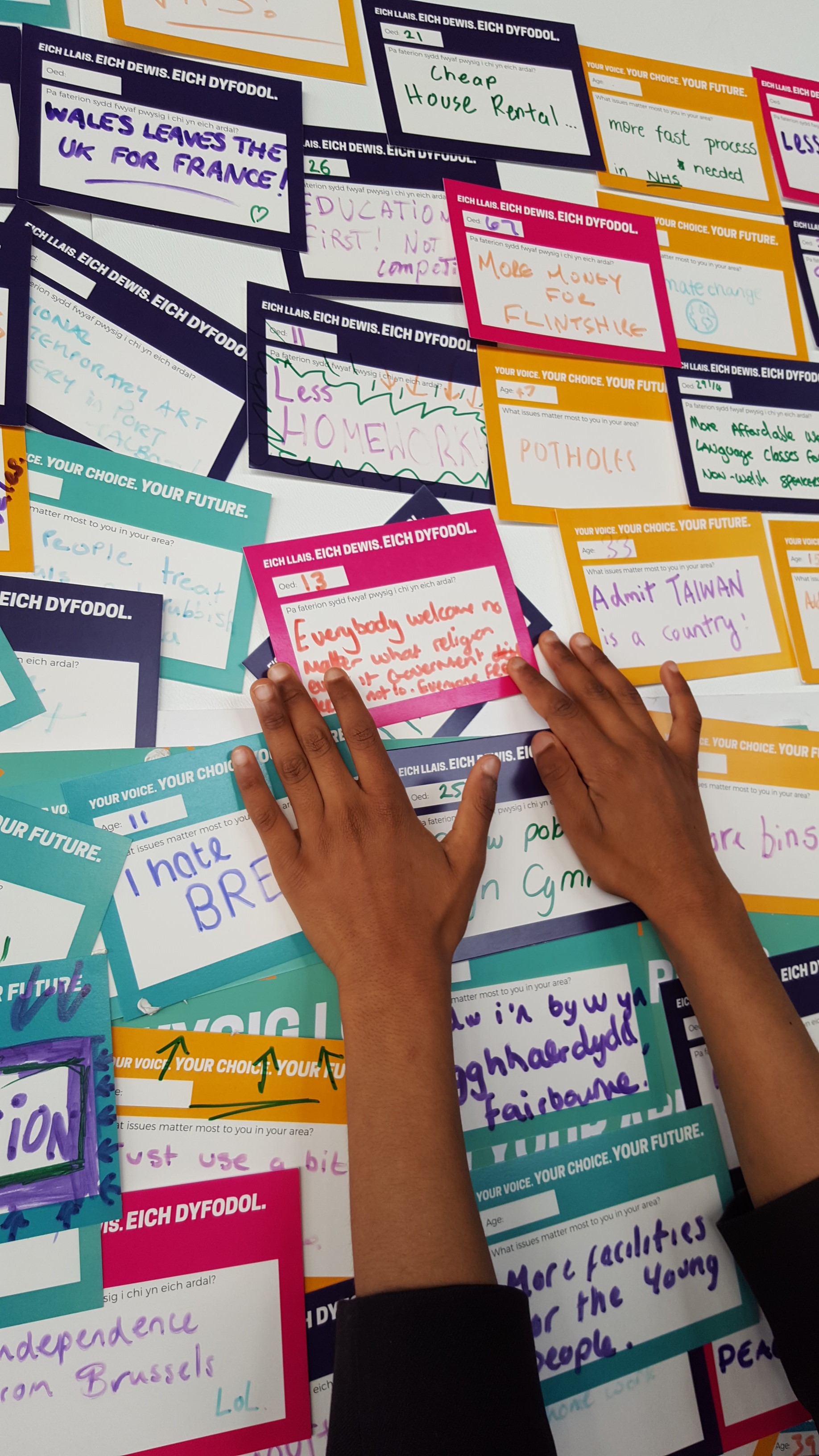“City and College should stand, shoulder to shoulder, facing the problems of life together”
These words were written by a member of the Cardiff University Settlement in 1906. The settlement was a radical experiment in education and friendship between the University and its immediate neighbours. 113 years later, these words still sum up why we are committed to working with audiences beyond our walls.
Over the last year, Cardiff University Libraries and Archives has been researching how to make our services and collections more appealing, accessible and useful to audiences outside academia.
To test some of our ideas, we’ve been running a number of pilot projects over the summer, aimed at creating opportunities to:
- Enjoy our libraries and archives
- Encourage responses to our collections
- Link people and resources
Here’s a look at what we’ve been up to:
Bringing Edward Thomas’ Archive to the Senedd
As an academic establishment, it’s so important for us to show how archives and libraries can spark creativity and reflection, as well as research and education.

As part of Literature Wales’ Holy Glimmers festival, we were joined by literary critic Jafar Iqbal and pupils from Fitzalan High School. Together, we explored letters and poems from Edward Thomas’ archive – discussing Mental Health, Family and Conflict in the poet’s work and creating original works, including poetry and literary criticism.
We presented this work to a welcoming crowd at the Senedd some weeks later. The class were given a special tour of the Siambr, and also took the chance to have their say on the Welsh Youth Parliament’s wall (pupils wanted less homework, and for us to be kinder to refugees).

This programme of work was a small example of how libraries and archives can be catalysts for new creative work – and that we can share that new work with wider audiences when we can collaborate with institutions like Literature Wales.
Library Escape Room
One of our aims for our Civic Engagement programme is to create opportunities for people to enjoy using our libraries – to encourage them to feel comfortable and confident when using our services and spaces. It’s also key that our staff get a chance to try something new, beyond the ‘business as usual’ of working with students and researchers.
The Escape Room was developed to encourage young people to take up space in our libraries, to enjoy exploring them and to build their confidence in using our services.
Cardiff University First Campus joined us to trial the activity – solving a series of locked puzzles to get their hands on a prize. First Campus holds summer schools for your people with Autism Spectrum conditions, and young people with experiences of the Care Sector, and the Escape Room activity was designed to be adapted according to the needs of each group.

It was a fun and successful trial – we will be adapting and refining the working model, with the aim of offering the Escape Room to secondary schools on a regular basis in the future.
Fake News with JOMEC and Media Wales
One of our biggest strengths as libraries and archives is our ability to match people with resources. We developed our Fake News project to enhance our Libraries’ role as a space for connection – by answering a genuine demand from our community by enabling access to expertise, equipment and new experiences.
We worked with English and Media Studies students from Fitzalan High School to create a project to take us out of the classroom and into newsrooms, broadcast studios, and to Cardiff University’s brand new journalism campus. Staff at JOMEC – Cardiff University’s School of Journalism, Media and Culture – and Media Wales were very generous with us, as we landed in their workspaces full of energy and questions!

In preparation for their own field interviews, the class worked with Media Wales on their interview techniques, and learned how journalists collect and verify information before it is printed. At JOMEC, we looked at research skills – how to find good quality information, and how to come up with canny questions that get to the heart of a topic.

On our last day together, we ventured out into the ‘real world’, using our new skills to create videos interviews with the general public – asking them about their attitudes towards fake news and the media in general. Due to a slight minibus crisis, we also got a last-minute trip to Glamorgan Archives in the bargain – thank you to the staff, who welcomed us all at very short notice!

Next term, we’ll be meeting again to co-create a digital resource, using the interviews we collected and what we learned from the experts at Media Wales and JOMEC. Our hope is that every school in Wales will be able to learn from our experiences, as we share our resource through the Welsh Government’s HWB platform.
Plans for the Future
It’s been a very busy summer, and this is only part of the picture – schools are only one of many audiences we work with, so we’ll continue to develop our programmes over the years to come, finding new ways to open up our collections to people across Wales and beyond.
We’ll be publishing our Civic Engagement strategy for Cardiff University Libraries and Archives in the new year – in the meantime, if you’d like to find out more about our programmes, and how we work, get in touch: mailto:specialcollections@cardiff.ac.uk
